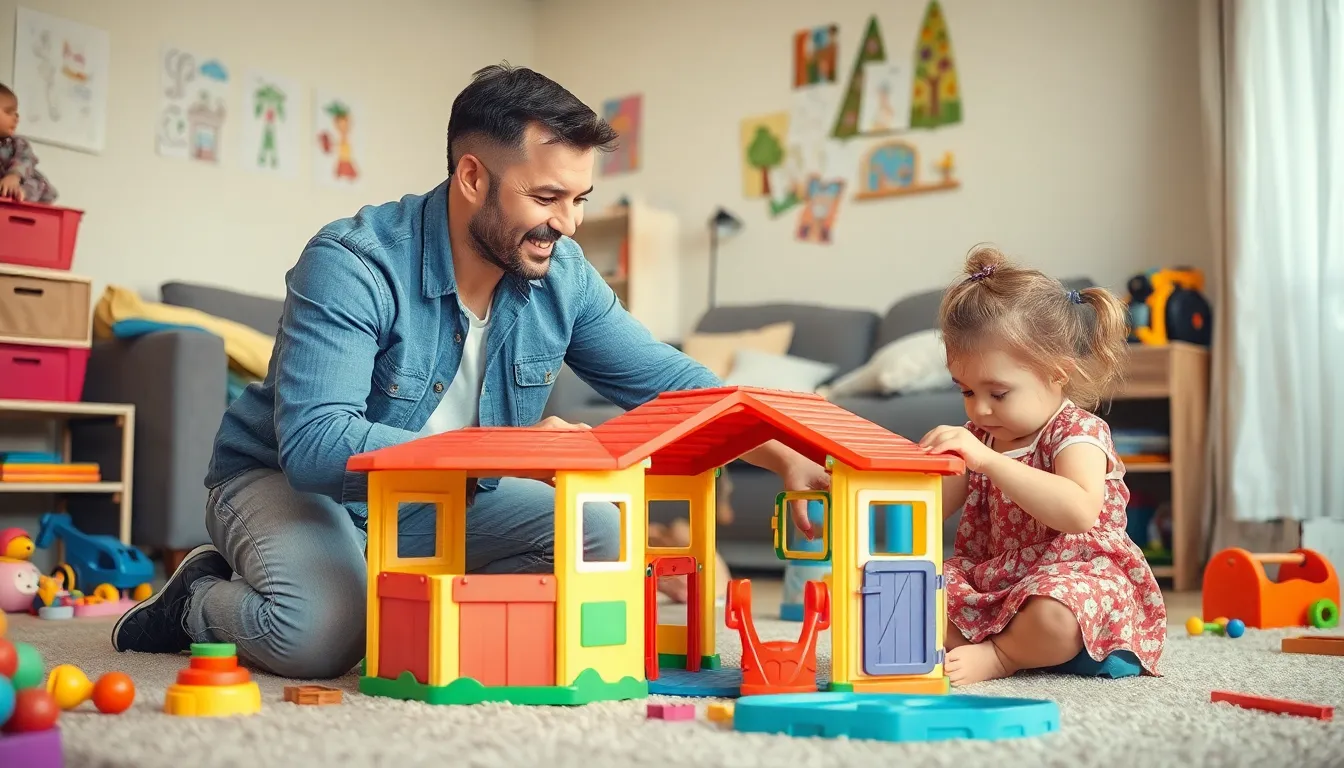When it comes to chores, parents often feel like they’re auditioning for a role in a never-ending reality show. But fear not! Age-appropriate chores can transform this daunting task into a fun family adventure. Imagine your little ones conquering dust bunnies and mastering the art of laundry folding like tiny superheroes. Not only does this lighten the load for parents, but it also teaches kids responsibility in a way that doesn’t involve a lecture on the importance of cleanliness.
From toddlers to teens, there’s a perfect chore for every age group that can turn mundane tasks into exciting missions. With the right approach, chores can become a bonding experience rather than a battlefield. So, let’s dive into the world of age-appropriate chores and discover how to sprinkle a little fun into daily responsibilities while preparing kids for the future. Who knew cleaning could be this entertaining?
Table of Contents
ToggleUnderstanding Age-Appropriate Chores
Age-appropriate chores play a crucial role in developing children’s skills and family dynamics. These tasks can promote collaboration and foster a sense of responsibility among kids.
Benefits of Assigning Chores
Assigning chores offers numerous benefits. Children learn valuable life skills while completing these tasks. Responsibility develops as they contribute to household maintenance. Increased confidence emerges when they accomplish chores independently. Furthermore, family bonding strengthens, as parents and children work together. Enhanced teamwork skills grow through shared responsibilities. Engaging in chores also cultivates a sense of achievement when completing tasks.
Developmental Milestones
Chores align with children’s developmental milestones. Toddlers can engage in simple tasks, like picking up toys. Preschoolers can assist in dusting surfaces or sorting laundry. Older children can tackle more complex chores, such as setting the table or preparing simple meals. Teens can manage their own laundry or help with grocery shopping. At each stage, chore complexity matches their growing abilities. This approach aids skill development while ensuring age-appropriate expectations are maintained.
Chores for Young Children
Engaging young children in chores supports their development and teaches responsibility. Assigning age-appropriate tasks can turn chores into enjoyable activities.
Age 2-4: Simple Tasks
Children aged 2 to 4 can handle simple tasks that promote independence. Picking up toys helps them learn organization. Wiping spills with a damp cloth introduces basic cleaning skills. Feeding pets allows them to take part in caring for animals. Putting away books fosters an appreciation for their belongings. These small responsibilities build confidence and create a sense of accomplishment in little ones.
Age 5-7: Basic Responsibilities
At ages 5 to 7, children are ready for more defined responsibilities. Making their beds instills habits of tidiness. Setting the table enhances their understanding of meal preparation. Sorting laundry teaches colors and organization. Helping with meal prep promotes teamwork and basic cooking skills. These tasks encourage responsibility while reinforcing skills beneficial for future independence.
Chores for School-Aged Children
School-aged children benefit significantly from age-appropriate chores that encourage responsibility, teamwork, and essential life skills.
Age 8-10: Increased Involvement
Children aged 8 to 10 can handle a wider range of tasks with minimal supervision. This age group can manage cleaning their rooms, organizing their school supplies, and helping with grocery shopping. Assigning them specific chores, like folding laundry or setting the table, fosters independence and enhances their problem-solving skills. Completing these tasks boosts their confidence while reinforcing their understanding of contributing to the household. Moreover, children can begin to understand the concept of routines by integrating these chores into their daily lives.
Age 11-13: Greater Accountability
Kids between 11 and 13 show maturity and can take on greater responsibilities. They can prepare simple meals, vacuum, and even assist with yard work. This age group understands the importance of accountability in their chores, as they correlate their contributions with family harmony. Encouraging them to manage their schedules while balancing homework and chores teaches valuable time management skills. As they grow, allowing them to take ownership of specific chores, like laundry or pet care, prepares them for independence in their teenage years. These experiences drive home the significance of teamwork and household balance.
Chores for Teenagers
Teenagers can take on more complex responsibilities at home. Age-appropriate chores enhance their ability to prepare for independence and manage household tasks effectively.
Age 14-17: Preparing for Independence
At ages 14 to 17, teenagers can handle significant responsibilities. Tasks like doing laundry promote self-sufficiency. Preparing meals encourages creativity and time management skills. Managing schedules for cleaning their spaces fosters accountability. Helping with grocery shopping allows teens to make healthier choices and understand budgeting. Completing yard work develops work ethic and appreciation for home maintenance. These chores collectively support their transition to adulthood.
Age 18+: Transitioning to Adult Responsibilities
Once individuals reach age 18, chores focus on adult responsibilities. Paying bills provides essential financial literacy. Coordinating household errands enhances organizational skills. Maintaining personal spaces ensures cleanliness and promotes hygiene. Engaging in meal planning helps with nutrition and budgeting. Involving them in maintenance tasks creates a sense of ownership over their living environments. Each of these chores helps ease the transition into independent living, preparing them for success in their future endeavors.
Conclusion
Embracing age-appropriate chores can significantly enhance family life while equipping children with essential skills. By involving kids in household responsibilities, families can foster a sense of teamwork and shared purpose. This approach not only lightens the load for parents but also prepares children for future independence.
As children tackle tasks suited to their developmental stages, they gain confidence and learn valuable life lessons. The journey from simple chores to more complex responsibilities creates a strong foundation for self-sufficiency. Ultimately, integrating age-appropriate chores into daily routines can transform household dynamics and nurture responsible, capable individuals.







